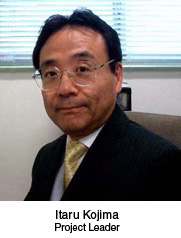Greetings from the leader

Gunma and Akita Universities have collaborated with each other beyond the border of university, and have started the Global COE program titled “Signal Transduction in the Regulatory System and Its Disorders”. The objective of this project is to elucidate the signal transduction mechanism in the biological systems via multidimensional approaches, based on the collaboration of the two universities. Gunma University carried out the 21st century COE program titled “Processing of Biosignals: Receptor Activation, Signal Transduction, Functional Expression and Animal Behaviors,” pursuing the mechanisms for producing, receiving, and transmitting signals in the two major regulation systems in the body: the nervous and endocrine systems, and produced significant results. Meanwhile, Akita University conducted the 21st century COE program titled “Cell Fate Determination Mechanism,” and produced fruitful results in the study of the signal transduction mechanism in the immune system and cancer. The two footholds Gunma and Akita Universities share the common theme of signal transduction, and many commonalities in the molecular and cellular analysis of signal transduction. On the other hand, the respective research fields “the endocrine and nervous systems” and “the immune system and cancer” are complementary to each other. Accordingly, the intensive collaboration of the two universities will enable the comprehensive study of the three major regulatory systems, the endocrine, nervous, and immune systems. Many studies have so far been done on the signal transduction in each regulatory system, but there have been few interdisciplinary, systematic studies on the complex regulatory mechanism. It is well known that derangement in the biological regulatory systems induces various disorders, and so it is obvious that in order to elucidate such disorders, it is important to do the research beyond the framework of the regulatory systems. For example, in atherosclerosis, hormones, cytokines, and growth factors cross-talk inside blood vessels. For the hormone production in fat cells, which is closely linked to the onset of the metabolic syndrome, the inflammatory reaction in adipose tissues plays important roles, and the complex signal transduction involving inflammatory cytokines and hormones is the core of diseases. In addition, in the appetite regulation in the central nervous system, of importance is the cross-talk among neurotransmitters and appetite-regulating hormones, such as leptin, ghrelin, and nesfatin, and the influence of inflammatory cytokines is significant. In order to clarify these disorders, it is very important to study the signal transduction mechanism beyond the framework of the three major regulatory systems. In such circumstances, Gunma and Akita Universities collaborate with each other in the present Global COE program, to clarify the signal transduction mechanism beyond the framework of the three major regulatory systems and then elucidate the complex pathophysiology of vaious disorders. In order for researchers of both universities to do joint research organically, the Global COE Organizing Office will be established beyond the border of both universities, and the collaboration in research will be deepened through the sharing of research resources and the information exchange among research groups. In addition, by holding international symposiums and global COE seminars for young scholars, etc., we will spotlight their activities inside and outside Japan. In addition, in the present project, we will develop young researchers, including graduate students and postdoctoral fellows, based on the collaboration between the Graduate Schools of Medicine of both universities. We plan to have technical courses and workshops targeted at young researchers, and also do a broad range of assistance for internationalization. Through these efforts, we will form an education/research foothold based on the collaboration of the two universities.